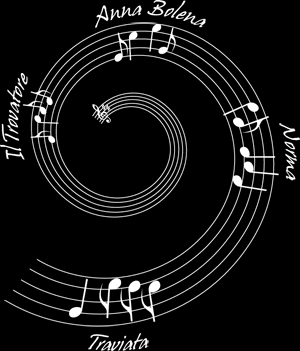 |
  |
 |
By reading these pages, you might think either that Callas was a goddess (incidentally, she was called la Divina) or that we are totally addicted to her.The truth is that we have intentionally chosen to talk about Callas’ greatest performances, but we do believe that she was not perfect and that she had weaknesses, like every human being.
Quite a few of Callas’ greatest roles have been broached in this site; but many others are missing: roles in which she made her début in Italy (Gioconda, Turandot…); I puritani, which made her famous; Verdi operas like Aida, Macbeth, Un ballo in maschera…, of which she gave electric live performances; Rigoletto and Il barbiere di Seviglia, of which Callas’ interpretations deserve to be better known; roles she recorded marvellously but never sang on stage, like Manont Lescaut and Carmen; and a field in which she was so great, the recitals like Callas ŕ Paris, and above all Lyric and coloratura arias.
|
|
Why another site about Callas?
There are plenty of personal web pages about the Divina in addition to the official sites; in each one, you will find either her biography, or her official or complete discography, or even both.
But when we read Michel Roubinet’s words about her greatest moments at the Teatro alla Scala, we decided first to listen to them, then to get people to benefit from them. |
 |
 |
|
"If the Teatro Alla Scala is not the only lyric theater to revive the art of la Callas through radio broadcasting – others like the San Carlo in Naples, the Communale in Florence, Covent Garden in London or the Palacio Bellas Artes in Mexico-City also count amongst places where pages of musical history were written - it undoubtedly recreates the echo of her most inspired performances, not only because of its public (with the exception of her detractors) no more expert than the London public for example, renowned for being the most faithful, but for the quality of its presence, for its intense contribution to the theatrical atmosphere.
Two examples illustrate particularly well this unequalled level of prolonged communion, this indescribable moment of pure joy between the end of an air, its lingering echo and the applause, acknowledgement and passionate loyalty to Callas’ genius: D’amor sull’ali rosee from Il Trovatore on February 23rd 1953, Al dolce guidami castel natio, first part of the glorious final scene at the premiere of Anna Bolena on April 14th 1957 - the public in sheer ecstasy was aware of the miracle. Can also be added the non less extraordinary Son io from Norma, accusing herself and renouncing the betray of Adalgisa (December 7th 1955), the gripping Ditte alla giovine from La Traviata (May 28th 1955): the Scala, living memory of the art of la Callas."
Written by Michel Roubinet
(translated from French)
|

